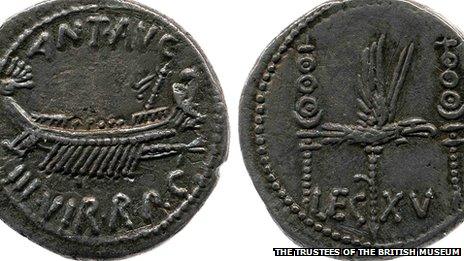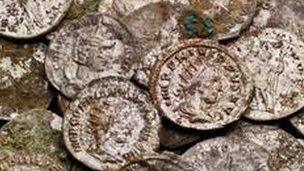Coin from 32 BC oldest in Beau Street Hoard
- Published

A coin from 32 BC similar to the one pictured was the oldest identified so far
The oldest Roman coin in a hoard discovered in Bath dates back more than 200 years earlier than the others already examined.
The Beau Street Hoard of more than 20,000 silver coins was found in a stone-lined box by archaeologists working in Bath in 2007.
Work has begun at the British Museum to clean them.
Stephen Clews, manager of the Roman Baths, said a coin from 32BC was the oldest identified so far.
British Museum conservator Julia Tubman said the coins were initially estimated to number about 30,000, but having excavated the soil block they were contained in, she believes there are no more than 22,000.
Discovered about 150 yards from the Roman Baths, the hoard is described as the fifth largest ever found in the UK.
'Developing story'
British Museum staff say it appears to be six smaller collections of coins in bags which is "very unusual".

The coins were found close to the Roman Baths
Mr Clews said the previous oldest coin found in the hoard was from about 190 AD but one has now been dated from the time of Mark Antony.
"The 32 BC coin is quite worn and must have circulated a bit before it was hoarded," he said.
He said the previous most recent coin was from 268 AD to 270 AD but one from 274 AD has now been found.
"The whole hoard must be at least five years younger than we thought," Mr Clews said.
"The make-up of the hoard may shift quite dramatically when a new bag is done.
"It's a developing live story."
Once cleaned, the Treasure Valuation Committee will value the hoard, which Mr Clews said could be by autumn next year.
The Roman Baths Museum hopes to eventually purchase the hoard and put it on public display.
- Published22 March 2012